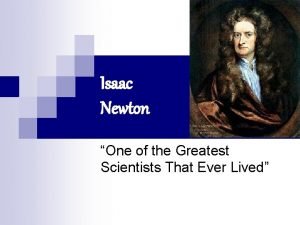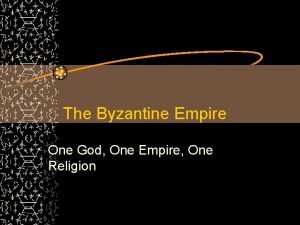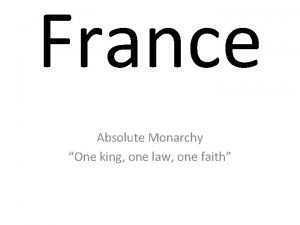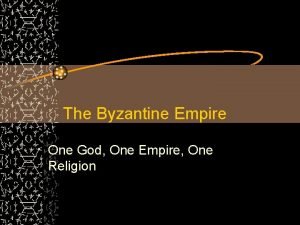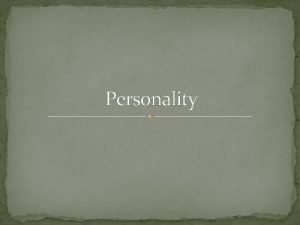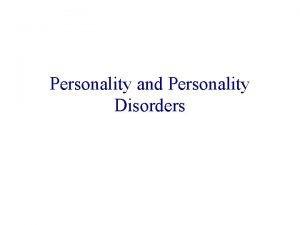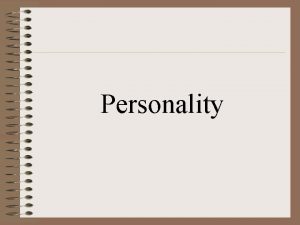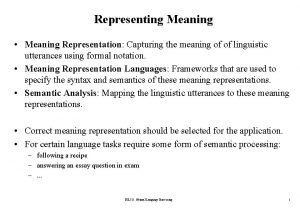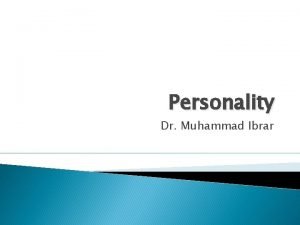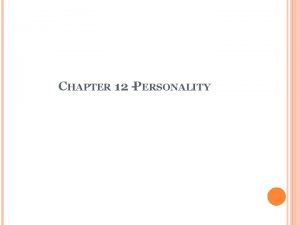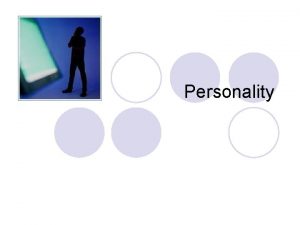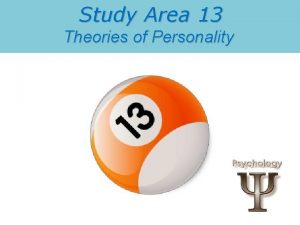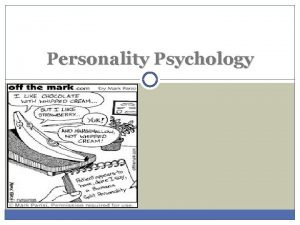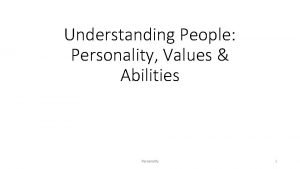PERSONALITY Meaning of Personality One of the greatest



























- Slides: 27

PERSONALITY

Meaning of Personality • “One of the greatest regrets in life is being what others would want you to be, rather than being yourself”. Shannon L. Alder Dear student, based on the above quote reflect on the following questions please? 1. What makes an individual different from others? 2. What do you think are the sources of personality difference among individuals? 3. Have you been asked to be a kind of person what others would want you to be? 4. Is there a big difference between what you want to be and what others want you to be?

Personality • The word personality is derived from the word persona‘, which has Greek and Latin roots and refers to theatrical masks worn by Greek actors. • personality is the unique pattern of enduring thoughts, feelings, and actions that characterize a person.

Theories of Personality Some of theories of personality are: Ø Psychodynamic Ø Trait Ø Humanistic.

The psychoanalytic theory of personality • Austrian physician named Sigmund Freud • He argued that people are in constant conflict between their biological urges (drives) and the need to tame them. • personality structure: -the id, the ego, and the superego.

More Freud…

Personality structure • 1. The Id; If It Feels Good, Do It • It is the collection of psychic energy. • It is the storehouse of biological drives that arise from our needs for food, water, warmth, sexual gratification and avoidance of pain • It is inborn. • It is governed by the pleasure principle the principle of hedonism/pleasure-seeking • The id has no link to objective reality • It looks for immediate discharge of tension arising from biological drives, without regard for logic or reason, reality or morality. • The id is like a demanding, selfish child. • It looks only its own pleasure.

2. The Ego; The Executive Director • It begins to develop soon after birth, but does not become apparent until the age of about six months. • It serves as a mediator between the id impulse and reality. • Unlike the id, the ego is conscious. • It operates according to the reality principle. • Satisfaction of biological needs is not given up; but reality is taken into account to satisfy these biological needs. • Takes into consideration past experiences • The ego cannot totally reject the id impulse. Rather like a patient parent, it attempts to control, divert and protect the id.

3. The Superego; The Moral Watchdog • It represents the ideals and moral standards of society as passed to the child by his or her parents in the process of socialization. • Through the socialization process the child learns the entire do and don’t. • Like the id, the superego is not attentive to reality, nor does it differentiate between desires and actions. • It constantly commands that sexual and other biological urges should be stopped and pleasure is postponed according to the ideals and morality of society. • The super ego has two main functions based on reinforcement processes.

Con… • For Freud, our personality is the outcome of the continual battle for dominance among the id, the ego, and the superego. This constant conflict between them is managed by psychological defense mechanisms. • Defense mechanisms are unconscious tactics that either prevent threatening material from surfacing or mask it when it does.

Defense Mechanisms § Regression § defense mechanism in which an individual faced with anxiety retreats to a more infantile psychosexual stage, where some psychic energy remains fixated

§ Reaction Formation § defense mechanism in which the ego unconsciously switches unacceptable impulses into their opposites § people may express feelings that are the opposite of their anxiety-arousing unconscious feelings

§ Projection § defense mechanism by which people mask their own threatening impulses by attributing them to others § Rationalization § defense mechanism that offers self-justifying explanations in place of the real, more threatening, unconscious reasons for one’s actions Example- A student who cannot do well academically, often satisfies himself by saying “It is not rewarding to work hard in this college”

§ Displacement § defense mechanism that shifts sexual or aggressive impulses toward another object or person § Sublimation § Channeling unacceptable impulses into constructive behaviors

Traits • Gordon Allport wrote the influential book, “Personality” in 1937. He developed his ideas about “traits” viewing these as the basic structural elements of personality. • Traits were defined as a tendency to respond in a particular way to a broad range of situations. So an even-tempered person remains calm across a broad range of situations. The situations or stimuli are rendered “functionally equivalent” - opportunities to exercise restraint. Each person has a certain expressive and adaptive style that they bring to the situation.

The trait approach assumptions • The trait approach to personality makes three main assumptions: 1. Personality traits are relatively stable, and therefore predictable, over time. 2. Personality traits are relatively stable across situations, and they can explain why people act in predictable ways in many different situations. 3. People differ in how much of a particular personality trait they possess; no two people are exactly alike on all traits (unique personalities).

Big 5 personality test 1. Extroversion A. Extroverted people • Energetic • Enthusiastic • Dominant • Sociable • Talkative . Introverted people • Shy • Retiring • Submissive • Quiet

2. Agreeableness A. High Agreeableness • Friendly • Cooperative • Trusting • Warm B. Low Agreeableness • Cold • irritable 3. Conscientiousness A. Conscientious • Cautious • Dependable • Organized • Responsible B. Impulsive • Careless • Disorderly • Undependable

5. Neuroticism 4. Openness A. High on Openness A. Emotionally unstable • Imaginative • Nervous • Witty • High-strung • Original • Tense • Artistic • Worrying B. Low on Openness B. Emotionally stable • Down to earth • Calm • Conventional • Contented • Conformist • Simple

Big Five personality dimensions (OCEAN) Openness to Experience (intellect, imagination, curiosity, creativity) Conscientiousness (order, duty, deliberation, self-discipline) Extraversion (sociability, assertiveness, activity, positive emotions) Agreeableness (trust, nurturance, kindness, cooperation) Neuroticism

Humanistic Perspective According to humanistic theorists, personality is conscious, self-motivated ability to change and improve, along with people‘s unique creative impulses. Carl Rogers and Abraham Maslow § Carl Rogers (1902 -1987) § focused on growth and fulfillment of individuals § genuineness § acceptance § Empathy

Carl Rogers’ Personality Theory Love the sinner, hate the sin I love you IF…

Cont… • Rogers believed that human beings are always striving to fulfill their innate capacities and capabilities and to become everything that their genetic potential will allow them to become. This striving for fulfillment is called self-actualizing tendency. • An important tool in human self-actualization is the development of an image of oneself or the self-concept. • The self-concept is based on what people are told by others and how the sense of self is reflected in the words and actions of important people in one‘s life, such as parents, siblings, coworkers, friends, and teachers.

Cont… Two important components of the self-concept are • the real self (one‘s actual perception of characteristics, traits, and abilities that form the basis of the striving for self-actualization) and • the ideal self (the perception of what one should be or would like to be). The ideal self primarily comes from those important, significant others in one‘s life, most often the parents.

Cont… • Rogers defined positive regard as warmth, affection, love, and respect that comes from the significant others (parents, admired adults, friends, and teachers) in people‘s experience. Positive is vital to people‘s ability to cope with stress and to strive to achieve self-actualization.

Cont… • Although self-actualization and to be fully functioning‘ are highly related concepts, there are some subtle differences. • Self-actualization is a goal that people are always striving to reach, according to Maslow (1987). In Rogers's view, only a person who is fully functioning is capable of reaching the goal of self-actualization. To be fully functioning is a necessary step in the process of self-actualization. • Maslow (1987) listed several people that he considered to be self-actualized people: for example. These were people that Maslow found to Albert Einstein, Mahatma Gandhi, Nelson Mandela …have the self-actualized qualities of being creative, autonomous and unprejudiced.

THANK YOU!
 What did isaac newton's mom want him to be
What did isaac newton's mom want him to be Newton one of the greatest scientists
Newton one of the greatest scientists Isaac newton one of the greatest scientists
Isaac newton one of the greatest scientists One empire one god one emperor
One empire one god one emperor One one one little dog run
One one one little dog run One king one law one faith
One king one law one faith Byzantine definition
Byzantine definition One ford behaviors
One ford behaviors See one do one teach one
See one do one teach one One price policy
One price policy One face one voice one habit and two persons
One face one voice one habit and two persons Studiendekanat uni bonn
Studiendekanat uni bonn Asean tourism strategic plan
Asean tourism strategic plan Graphic organizer with the aims of la liga filipina
Graphic organizer with the aims of la liga filipina One team, one mission meaning
One team, one mission meaning One team one mission meaning
One team one mission meaning Hát kết hợp bộ gõ cơ thể
Hát kết hợp bộ gõ cơ thể Lp html
Lp html Bổ thể
Bổ thể Tỉ lệ cơ thể trẻ em
Tỉ lệ cơ thể trẻ em Chó sói
Chó sói Chụp tư thế worms-breton
Chụp tư thế worms-breton Hát lên người ơi
Hát lên người ơi Các môn thể thao bắt đầu bằng tiếng nhảy
Các môn thể thao bắt đầu bằng tiếng nhảy Thế nào là hệ số cao nhất
Thế nào là hệ số cao nhất Các châu lục và đại dương trên thế giới
Các châu lục và đại dương trên thế giới Công thức tính thế năng
Công thức tính thế năng Trời xanh đây là của chúng ta thể thơ
Trời xanh đây là của chúng ta thể thơ
